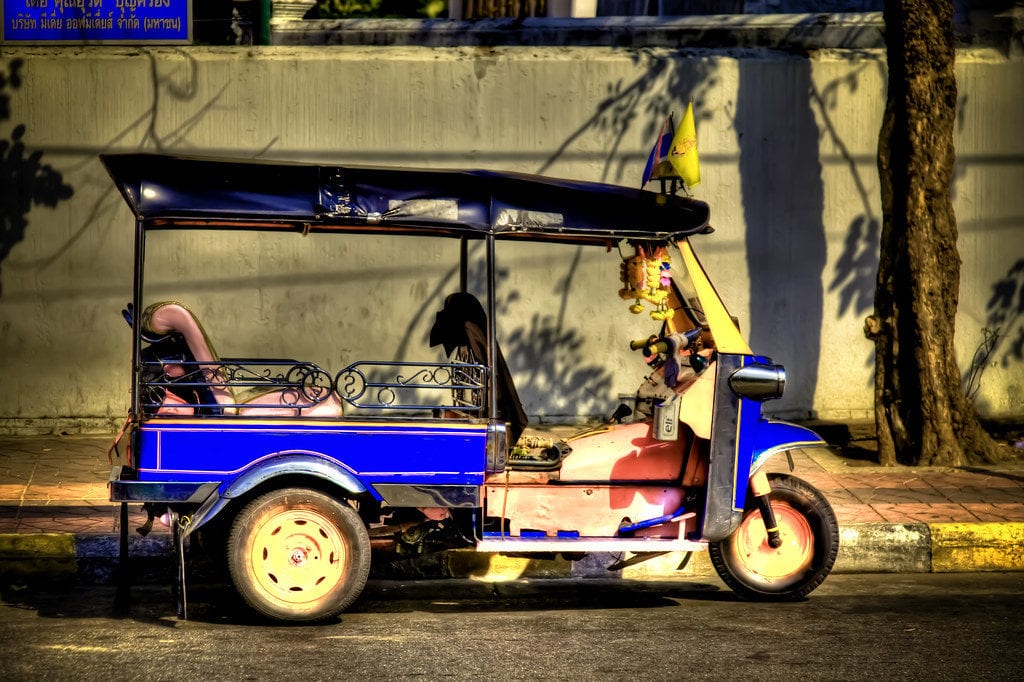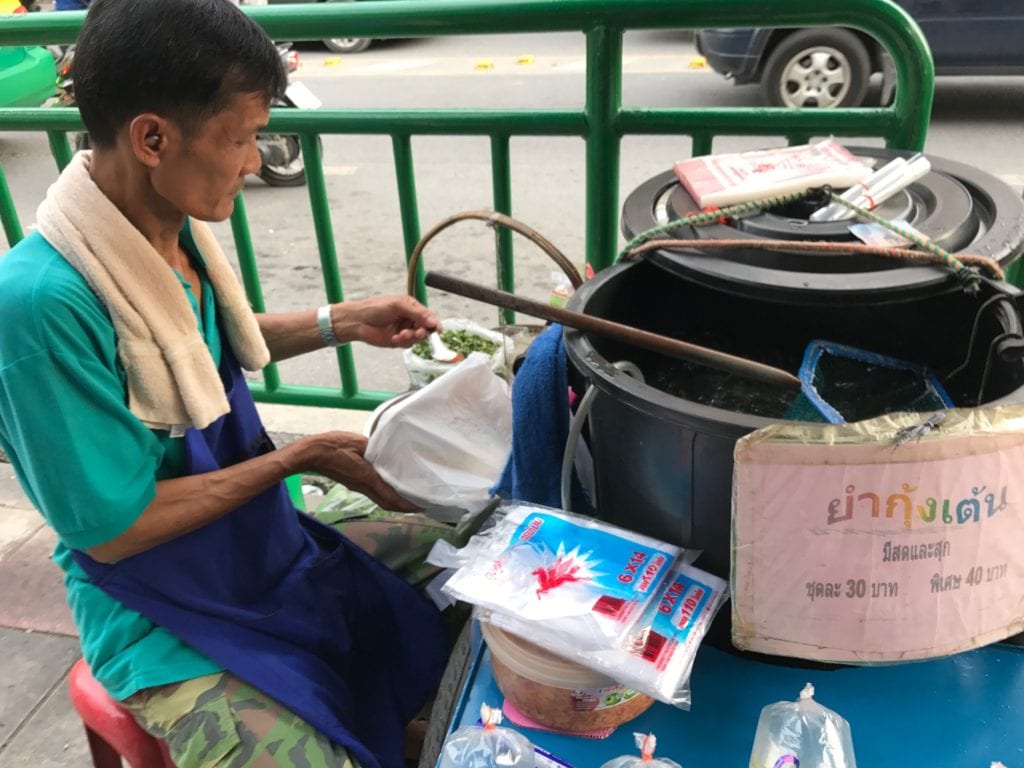Tuk Tuk Tours
Explore Bangkok by the iconic tuk tuk

There’s more to Thai than ‘sabai dee mai?’ – although it’s true that this question, meaning ‘are you well?’, is one of the first visitors to Thailand learn. One of the other most commonly picked up phrases is ‘sawasdee’, the Thai word for ‘hello’. Most tourists also come away with the word ‘aroy’ – or ‘delicious’ – to describe the vast array of incredible Thai food they have sampled their way through during their time in Bangkok and elsewhere around Thailand. The vast majority of overseas visitors get along perfectly fine with just those three words – or, in plenty of cases, even fewer – but, just as anywhere else in the world, making the effort to learn even a handful more can make a world of difference both to your own experience in Thailand and to the locals you meet and interact with along the way.
Do you need to learn Thai before you visit Bangkok?
These days, lots of guide books will have you believe that – at least in Bangkok – most people speak a degree of English, enough for you to be able to get by as a short-term visitor without putting too much effort into learning Thai. While that’s not entirely inaccurate, and English language skills are gradually becoming more widespread in younger generations, it’s still perhaps something of an overly generous assessment.
It’s true that most affluent middle- and upper-class, many of whom have been privately educated either in Thailand or overseas, speak a good amount of English. Indeed, you’ll also probably come across plenty of Thais who speak perfect English, to the point that they might even sometimes sound better at it than some native speakers!
Thai people working in the tourism industry, or in big international firms and other companies dealing with overseas clients, are also likely to speak some English – although how much can vary dramatically. However, it’s not unfair to say that most Bangkokians still speak little or no English. And that’s perhaps understandable since, despite the impression you might get downtown of Bangkok being a glitzy and outward-looking 21st-century global metropolis (and it is), the majority of ordinary Thais have no interaction with English-speaking foreigners in their day-to-day life and work.

While there are certainly some who are exceptions, unexpectedly pulling out a whole reel of conversation-starters and impressively advanced language, you are best off assuming that the English skills of your average street vendor or taxi driver might well extend to just a few words that allow them to earn a living by selling to tourists. As you head further out of tourist-geared central Bangkok and into the city’s more local and residential suburbs, you can expect those skills to dry up further still.
Just as in the capital’s tourist hotspots, outside of Bangkok English is well spoken in the most widely visited other provinces and destinations like Phuket, Koh Samui, Chiang Mai and Pattaya, and at the most prominent attractions in other locations where tourists are likely to show up. Meanwhile, if you’re planning on travelling to more offbeat, rural upcountry towns and villages (and even big cities that are well and truly absent from the tourist radar), you would do well to start from the assumption that zero English will be spoken (although that’s not to say that people won’t still be keen to help in any way they can).
If your Thai skills are lacking, then this is where lots of hand gestures and smiles will come in handy. You’ll certainly survive this way, but life in Bangkok will be easier and more enjoyable if you come armed with even a handful of words and phrases that you can pull out when you need them most.
You’ll find yourself able to ask the lone grandma street food vendor hunched over a grill on the street corner how much she’s charging for the delicious-looking morsels you don’t know the name of but are sure you want to try. You’ll be able to acknowledge and return the pleasantries paid to you by friendly Thais as you wander narrow alleyways in more out-of-the-way locales around Bangkok. And you’ll be able to tell a motorbike taxi driver where you want to go, meaning you’re charged the real local fare.
More reasons to learn some Thai
Once upon a time, foreign speakers of the local language were such a rarity that a non-Thai being able to converse would leave unsuspecting locals stunned such a show-stopping spectacle. These days, foreigners fluent in Thai (or close enough) are still something of a novelty, but there are now enough of us – in everyday local communities, on social media, and in smaller numbers on mainstream TV – that it’s a bit less of a big deal.
Thais are now especially used to meeting tourists who have brushed up on some of the basic lingo in advance of their holiday, but it’s nevertheless still something that’s widely admired and appreciated. You can expect to get plenty of surprised smiles and exclamations of how ‘clever’ you are to be able to speak some Thai – especially from friendly non-English-speaking folks glad that it means they can now have something of an exchange with you in a way that might not have been possible if you hadn’t made the effort.
Speaking a little Thai will win you the hearts of the kind of generous vendors who are likely to give you a discount on your meal, or perhaps a little extra treat, after your efforts to speak Thai warm you to them in a way most tourists aren’t. And if you’re lucky, it might even afford you a little protection against that other kind of vendors, the unfortunately more jaded, opportunistic ones out to fleece tourists by attempting to overcharge. Even uttering a word or two of Thai can give them the impression (true or not) that you live here or otherwise just know your stuff, and you’re perhaps someone they are better off not trying their luck with.
Essential Thai phrases
These are 21 of the most essential Thai phrases you are likely to want to use during a short stay in Bangkok. Remember to use the correct politeness particle at the end of each phrase (which tends to replace the need for the word ‘please’) – ‘ka’ if you are a woman, or ‘krub’ if you are a man. To get a better idea of pronunciation, you can also copy and paste the Thai script for each phrase below into Google Translate and click the speaker icon to hear the phrase spoken out loud in Thai.
Sawasdee ka/krub, sabai dee mai ka/krub
สวัสดี ค่ะ/ครับ สบายดีไหม ค่ะ/ครับ
Hello, how are you?
If you’re asked this question yourself, your answer can be ‘sabai dee ka/krub’ to mean you’re well, or ‘mai sabai ka/krub’ to mean you’re not well.
Korp-khun ka/krub
ขอบคุณ ค่ะ/ครับ
Thank you
Cheu arai ka/krub
ชื่ออะไร ค่ะ/ครับ
What’s your name?
If you’re asked this question yourself, your answer is simply ‘cheu’ followed by your name and ‘ka’ or ‘krub.
Ah-yoo tao rai ka/krub
How old are you?
อายุเท่าไหร่ ค่ะ/ครับ
To answer this yourself you’ll need to know enough Thai numbers, but your answer is simply ‘ah-yoo’ followed by the number for your age and ‘ka’ or ‘krub’.
Bpen khun prathet arai ka/krub
เป็นคนประเทศอะไร ค่ะ/ครับ
Which country are you from?
To answer this yourself you’ll need to know the Thai word for your country of nationality, but your answer is simply ‘bpen khun’ followed by the name of your country and ‘ka’ or ‘krub’.
Nee tao rai ka/krub
นี่เท่าไหร่ ค่ะ/ครับ
How much is this?
Lot raka noi dai mai ka/krub
ลดราคาน้อยได้ไหม ค่ะ/ครับ
Can you discount the price, please?
Ao ah-nee ka/krub
เอาอันนี้ ค่ะ/ครับ
I’ll take this one, please.
Man paang/took ka/krub
มันแพง/ถูก ค่ะ/ครับ
It’s expensive/cheap.
Mai sai toong/lord ka/krub
ไม่ใส่ถุง/หลอด ค่ะ/ครับ
No bag/straw, please.
Mai dtong torn ka/krub
ไม่ต้องทอน ค่ะ/ครับ
Keep the change.
Mii bang yoi mai ka/krub
มีแบงค์ย่อยไหม ค่ะ/ครับ
Do you have (small) change?
[Hawng-naam/tanakarn/satanee rot fai] yoo nai ka/krub
[ห้องน้ำ/ธนาคาร/สถานีรถไฟ] อยู่ไหน ค่ะ/ครับ
Where is the [toilet/bank/train station]?
Bpai [dtalat] ka/krub
ไป [ตลาด] ค่ะ/ครับ
I’m going to [the market].
You can use the same phrase when speaking to a taxi driver etc to mean ‘take me to [the market], please’.
Bpert meedter hai noi ka/krub
เปิดมิเตอร์ให้น้อย ค่ะ/ครับ
Turn the [taxi] meter on, please.
Kor-tohd ka/krub
ขอโทษ ค่ะ/ครับ
Sorry/excuse me.
Mai bpen rai ka/krub
ไม่เป็นไร ค่ะ/ครับ
No worries/no problem.
Mai kao jai ka/krub
ไม่เข้าใจ ค่ะ/ครับ
I don’t understand.
Poot thai mai dai ka/krub
พูดไทยไม่ได้ ค่ะ/ครับ
I can’t speak Thai.
Poot thai die kair nidt noi ka/krub
พูดไทยได้แค่นิดหน่อย ค่ะ/ครับ
I can only speak a little Thai.
Poot pasa [ang-grit] dai mai ka/krub
พูดภาษาอังกฤษได้ไหม ค่ะ/ครับ
Can you speak [English]?
You’re not going to be fluent before you leave, but making an effort is all that’s needed – and, with a little practice, you’ll be surprised at how much you pick up in a short time!
For some more food & eating phrases you can learn more here
At Expique our mission is to help people discover the real Bangkok (and beyond) and the local cultures. We do this through a combination of offering our own award winning tours and through producing informative content.
Our range of experiences in Bangkok including our award winning Bangkok Night Lights Tuk Tuk Tour and our foodie extravaganza Evening Food & Tuk Tuk Adventure.
Subscribe to our newsletter to receive monthly news and tips about exploring Bangkok.
Photos by Jacob Montrasio and Chris Wotton